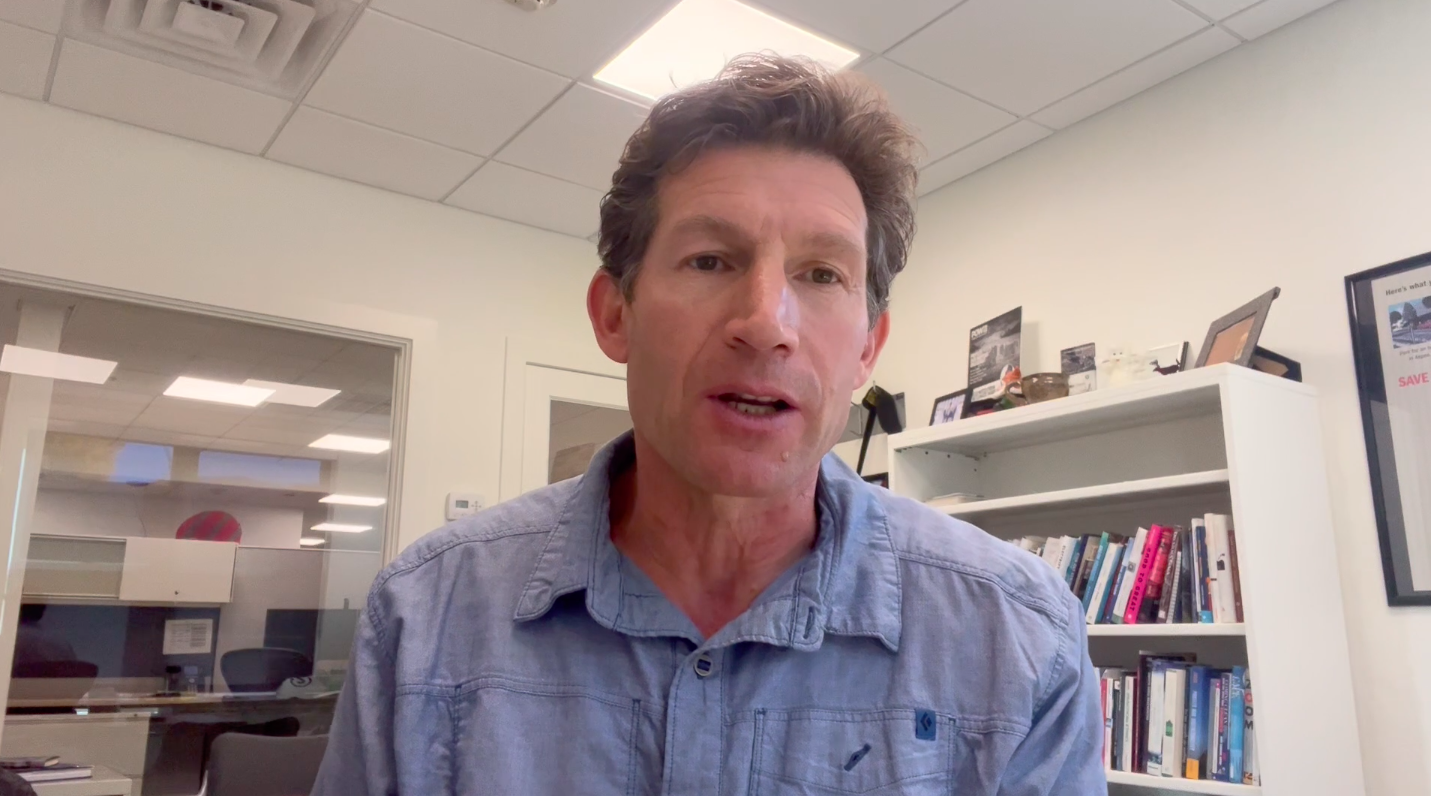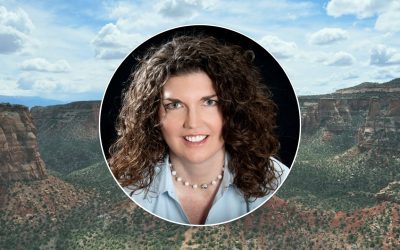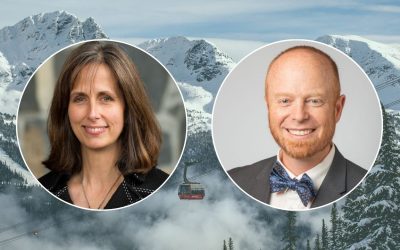“You have a huge, powerful constituency that visits you. You can educate them and mobilize them, not to tell you not to change their towels, but to get involved as a citizen in politics.” – Auden Schendler
Despite some progress, the world is not yet on track to meeting its Paris Agreement targets to limit global warming. What will it take to get there, and how can the travel industry lead the way to rapid, systemic change?
A 2024 sustainability report released by Aspen One offers some clues. 25 Years of Questions is a strategy to engage travellers as citizens who advocate for climate solutions. The report goes beyond the usual self-reflection of corporate sustainability strategies to wield its influence in the political arena.
Auden Schendler was a key contributor to the report for Aspen One and is a decades-long corporate sustainability veteran and climate leader with Aspen Skiing Company. On this episode of Travel Beyond, we share a short but powerful talk he recorded for us about what’s working in corporate sustainability, what has fallen short over the past 30 years, and what to do next. If you want an example of a travel business thinking bigger and pushing for systemic change, here it is.
This episode, you’ll learn:
- Why current corporate sustainability work tends to reinforce the status quo in favour of the fossil fuel industry.
- Lessons from a 25-year climate leader in the travel industry and examples from his past experiences.
- Why truly effective climate action in business comes from wielding power and influence to drive systemic change.
- Why showing customers how to get involved as a citizen in politics is an important lever of change.
Subscribe to Travel Beyond through Apple Podcasts, Spotify, or your favourite podcast player.
Show notes
- 25 Years of Questions – The 2024 sustainability report published by Aspen One, the parent company of Aspen Skiing Company.
- The world-changing adventures of Aspen Skiing Company – Our August 2023 Travel Beyond episode featuring Auden Schendler.
Episode transcript
Auden Schendler: You have a huge, powerful constituency that visits you. You can educate them and mobilize them, not to tell you not to change their towels, but to get involved as a citizen in politics.
Because we have the opportunity to solve a civilizational problem, you’re obliged to do it.
David Archer: Hello, and welcome to Travel Beyond, where we partner with leading destinations to bring you inspiring solutions to the greatest challenges facing communities and the planet. I’m David Archer from Destination Think, recording from Daajing Giids, British Columbia in Canada, which is a village in Haida Gwaii on the territory of the Haida Nation.
On this show, we look at the role of travel and highlight destinations that are global leaders. We talk to the changemakers who are addressing regenerative travel through action in their communities and often from the bottom up.
And as we at Destination Think gather all those stories, and as we work with many destinations on sustainability and climate issues, we like to keep track of some of our past guests and their travel destinations to see how things are progressing.
One of those guests is Auden Schendler, the Senior VP of Sustainable Development at Aspen Skiing Company in Colorado.
You might remember him from the final episode of our Aspen season back in August 2023. Definitely go and listen to that episode if you haven’t already, because it is one of our favorites, and in it he shares some highly specific and impressive examples of climate solutions driven by tourism, and talks about their impact. And the reason we’re doing this follow-up episode today is that Auden’s been busy since then.
In January of this year, Aspen One, the parent company of Aspen Skiing Company, released their 2024 sustainability report called 25 Years of Questions. for tuning And really, the way this document reads is less like a report or tourism strategy, and more like a graphic novel crossed with a manifesto, I think. It’s very accessible and exciting. It’s full of examples of climate action that are led by the company, and often involve participation from their customers, the visitors to Aspen ski hills and other outdoor activities. The report sets out three clear strategies and it also even recommends some books to read. It’s really worth looking at this if you’re involved with tourism planning of any kind, if only for the pure storytelling they’ve achieved. And as a guy who’s co-written dozens of strategies with the team at Destination Think, I am impressed by what they’ve pulled off here.
The three strategies in the report are: wield power, spread the word, and model solutions. And the rest of the document is filled with examples of how to do just that, some of which we’ve talked about on this podcast.
And related to that, we have a short talk to share from Auden.
He was one of the report’s key contributors, and he’s a decades-long leader in sustainable business and climate action. Auden recorded this talk for us in the fall of 2023, and we shared it with colleagues and collaborators as part of an event we held in Aotearoa, New Zealand.
And for a little background, at Destination Think, we’re working with the entire Queenstown Lakes district to implement their destination management plan and their Carbon Zero by 2030 ambition. And you can hear all about that in the second season of this podcast. We recently ran a workshop for more than 100 of the district’s most ambitious tourism folks and inspiring human beings.
And during that event, we organized so that two mission-aligned tourism leaders could also dial in and speak with them. Jos Vranken from the Netherlands Board of Tourism and Conventions and Auden from Aspen Skiing Company. Aspen is also Queenstown’s sister city.
Aspen Skiing Company has been leading on climate and sustainability for decades under Auden’s watch, and he has a critical message for the travel industry today, and especially for corporate sustainability leaders.
There’s no more time for sustainability as usual, he says. It just isn’t working. He tells us that individual responsibility and incremental actions like measuring carbon footprints and changing light bulbs is exactly what the entrenched interests would want us to do.
So what to do instead? Well, there’s a very clear alternative, he says. We need to use our voices to advocate for rapid system change. This is, we think, the most critical message the travel industry could hear right now, and Auden’s voice is one of the most effective we’ve seen so far.
So I’ll play his talk now. Here is Auden Schendler from Aspen Skiing Company.
Auden Schendler: Hi, everyone. It’s Auden Schendler from Aspen, Colorado. I run the sustainability programs at Aspen Skiing Company, and I’ve done that for 25 years. Thanks for having me today. I’m pleased to be talking to my friends down under about sustainability, sustainable tourism and sustainable business. I’m going to deliver a really quick message here about conventional practice and how we can do better in this field.
And I want to start by saying that I am from the traditional corporate sustainability world. This was a vision that started 30 years ago with Ray Anderson at Interface Carpet and Paul Hawken. And the vision was that business was the only entity that was big enough, powerful enough, autocratic. And therefore able to move quickly, so nimble and motivated by profit, to become a material part of the climate solution. And that many of these climate solutions were profitable. So changing light bulbs and boilers and renewable energy. You could do that and make money and it would be good for the bottom line. But it would also increase customer interest in your work. Think of Patagonia. You’d retain employees better and so on and so forth.
Now, all of this played out. It’s an incredibly compelling thesis. The only problem has been that it didn’t do enough to solve climate change. So for example, a business that cut its emissions 30%, that’s incredible. It’s amazing. It’s superhero stuff.
And yet, every business needs to cut its emissions almost to zero by 2050 if we want a stabilized climate at two degrees Celsius. That’s beyond Paris target of 1.5 C above pre-industrial times. So it’s not enough, and it’s voluntary. So not everyone’s doing it. So the entities that are so inclined chip away at their emissions, and we don’t achieve what we need to achieve.
And so the question is under this thesis, which is incredibly compelling and fun and cool: When is it going to kick in? We hit, as a globe, 1.8 degrees Celsius above pre-industrial times in September. So how long is it going to take for this thesis to kick in? And the answer is, it’s not. This isn’t enough.
And in my history in this work, I’ve become increasingly cynical about the concept of corporate sustainability. But I’ve also become optimistic that there are other ways to address this problem. So I want to lay out the idea pretty quickly because it’s so compelling.
So the idea was that maybe we can solve for resource and energy use with thought and design. And these are ideas like, uh, amazing ideas, like, if you put high-efficiency toilets and waterless urinals in a skyscraper to save water, you end up also saving pumping energy. 8 percent of energy in a skyscraper is pumping energy.
So while you save water, you save energy. It’s good for the bottom line. This is wonderful. And I did this work for many years. I changed light bulbs in our company. Uh, we changed boilers. We built some of the first LEED certified green buildings in the world. And we did this, and did this, and did this. And our carbon emissions didn’t go down.
And after about 10 years of this work, I thought, what’s the problem here? And I looked at our utility, and it turned out that our utility had invested in a coal-fired power plant. So it didn’t matter what we did. It mattered how we influence the world.
And in this specific case, we ended up pushing on that utility and changing the board, running elections. It was 15 years. It was street fighting. We changed the utility. They went from 6 percent renewable energy to, in a year they’ll be 90%. And we get ourselves to 100 percent clean electricity along with the whole community.
The point of the story is that you don’t solve climate and achieve sustainability by looking at your own house and operating within your own operations. You have to think bigger. And my evolution in this work has gone from great optimism about corporate sustainability to really, frankly, deep cynicism, but hope that there are other ways to square this circle of sustainability and climate solutions.
And the thing you have to ask is: When is the sustainable business thesis going to play out? We’ve spent 30 years on this. Emissions keep rising. It’s not working. We need to think differently. So in my work, initially I thought, hey, this sustainability stuff, operational greening, carbon targets, carbon footprinting, offsetting, all these things. It’s good, but it’s not enough. We need to do some other stuff.
And the other stuff we need is, we need to wield power to drive systemic change. That means influencing policy. It means creating a movement. It means the kind of work we did at our utility versus at our hotels. And I thought, ah, it’s not enough. We’ll do both of these.
But then I had a more cynical realization, which was that actually this work is a distraction from the other stuff. It’s taking our eye off the ball. And I kept working and kept thinking about it. And I got to another point, which was actually, business doesn’t want to get politically engaged. They don’t want to talk about climate change as a problem. They don’t want to lobby publicly for climate legislation, because business doesn’t argue for legislation. Their whole deal has been to fight regulation, in the U.S. In particular.
So I got to a point where I thought, wait a minute, if I were the fossil fuel industry and I wanted to make sure the status quo held in the world, but I wanted corporations to appear to be doing good and not get criticized for doing more, what would I have them do? The answer is, I’d have them practice corporate sustainability as currently practiced.
So what that means is that business is complicit with the fossil fuel status quo, and here’s what I mean by that. All the things business does, carbon targets, footprinting, light bulb changing, supply chain stuff, offsetting, renewable energy certificates, all those things. None of those things remotely threaten the fossil fuel economy. If you did the best possible work you could possibly do in conventional corporate sustainability, the fossil fuel industry would continue unabated and would monetize the 33 trillion dollars in proven reserves that are remaining. And that’s what they want to do.
What don’t they want you to do? They don’t want you to write an op-ed in the Wall Street Journal or your national paper saying we need climate policy. They don’t want you to publicly shame these corporations for hiding climate science since the 1950s, like ExxonMobil has done. They don’t want you to get your constituents in the tourism industry who are very powerful and very influential and very fanatical and who also are potentially environmentalists, because they’re outside – there’s some element of environmental concern there – you don’t want them mobilized like a movement, because they know that movements are powerful.
Think about in the U.S., the National Rifle Association had only 5 million members, but won on the issue of guns in the United States. The outdoor industry in the United States is, depending on how you measure it, between 40 and a hundred million strong. What if they were mobilized as a force on climate?
So the point I’m making to you all is, my guess is the bulk of what you’re doing for sustainability involves looking at yourself. What are our emissions? What are our scope three emissions? How do we reduce that? How do we go carbon zero?
And my point is, that’s great. You should do it. Keep doing it. It’s a good practice. It’s important to model solutions. It educates guests. It changes norms, but it’s not enough. You also have to wield power. If your CEO hasn’t spoken about the need for climate action and the threat climate poses to your industry, you’re not a green company.
If you haven’t published an op-ed from leadership in your company in a paper saying you need action, you’re not leading the way you could. You have a huge, powerful constituency that visits you. You can educate them and mobilize them, not to tell you not to change their towels, but to get involved as a citizen in politics.
There’s a big, big opportunity here. You, in your world, you have an obligation to do it, not just for self-preservation, but because it’s a moral imperative. For us, because we have the opportunity to solve a civilizational problem, you’re obliged to do it. So thank you for what you’re doing. Thank you for bearing with me and listening to me.
I’m sorry I can’t be there in person. And I look forward to seeing what you do as we work to solve the climate problem.
David Archer: That was Auden Schendler, Senior VP of Sustainability at Aspen Skiing Company. If you’d like to learn more about these ideas, along with some examples of effective climate action related to travel and business, I recommend listening to our previous episode with Auden, and I also highly recommend reading the 2024 Sustainability Report by Aspen One.
That report ends with an assignment for anyone reading. It says, “Given who I am, what is my biggest lever on climate change? Where do I have the most power to create large-scale systems change?” It’s worth thinking about.
This has been Travel Beyond presented by Destination Think. For more resources about this episode, visit the blog at DestinationThink.com.
This show has been produced and has theme music composed by me, David Archer. My co-producer is Sara Raymond de Booy. Lindsay Payne and Annika Rautiola provided production support.
Thank you to Auden Schendler for allowing us to share this talk, and thank you as well to Aspen Chamber Resort Association for connecting us with Auden in the first place and for sponsoring last year’s podcast season.
As always, if you like what you hear, please subscribe, share with a friend, leave a rating on Apple Podcasts or Spotify. All those things help more people find our show.
And we’ll be back next time. See you then.










0 Comments